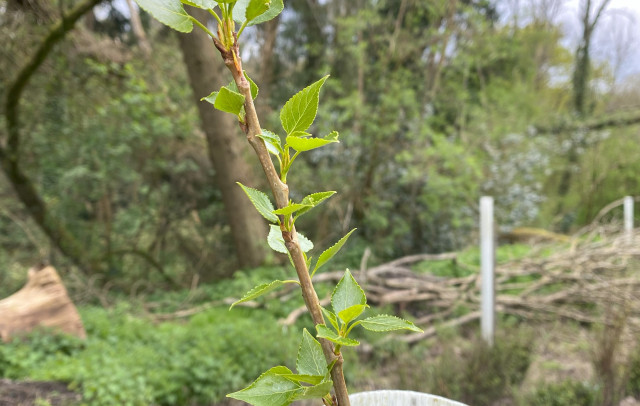Update 03/02/25: All trees have now been allocated but we are taking requests for trees for the 2025/26 season so please get in touch to register your interest via the form on this page.
Fancy helping one of our rarest and endangered native timber trees make a comeback, while at the same time helping boost a vital source of food for many caterpillar, bee, insect and bird species? Then read on…
The tall and elegant Black Poplar was once an abundant tree species in Britain. However over recent years this imposing tree has become rare, and according to the Forestry Commission it is one of the most endangered native timber tree species in the UK.
These beautiful trees thrive in wet, boggy areas, and we are now on a mission to help boost numbers of the Black Poplar by planting them in our project area.
Black poplar is the food plant for the caterpillars of many moths, including the hornet, wood leopard, poplar hawk and figure of eight. The catkins provide an early source of pollen and nectar for bees and other insects, and the seeds are eaten by birds. They are a brilliant source of food for so many species, but numbers are now low. Can you help by providing a space for one of these special trees?
Working in partnership with Wakehurst Place, Kew, we are leading on the Sussex Black Poplar project, which is now offering free trees for conservation purposes to organisations, communities and individuals.
If you are planning any tree planting, or know a local group who are, and would like to include some of these rare and beautiful Black Poplar trees for free, please get in touch using the form at the following link - Bringing Back the Black Poplar · Western Sussex Rivers Trust.
The whips are between 2ft – 4ft tall and are bare rooted, you will need to provide your own tree guards and stakes. Once we receive your enquiry a member of WSRT or Wakehurst Place staff will contact you when the whips are ready for collection from Wakehurst, Ardingly.
The Black Poplar trees are free, however should you wish to support our work donations are always welcome.
Donate to Kew or the Western Sussex Rivers Trust today.
Thank you in advance for your help to give this beautiful tree species a chance of making a comeback to the English countryside.
